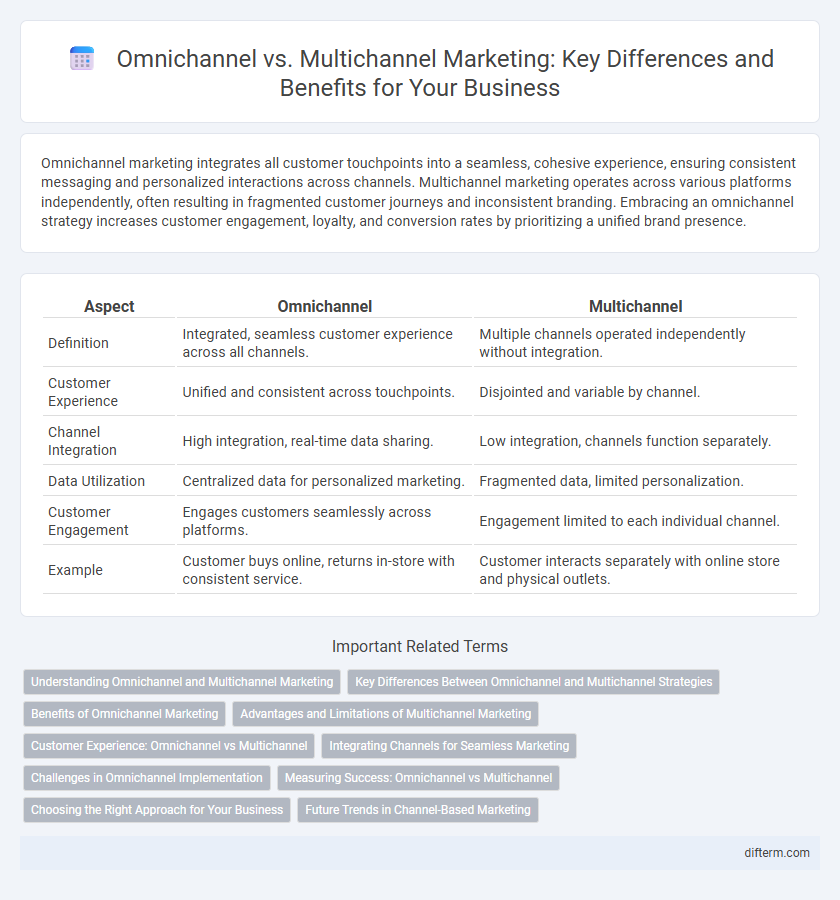Omnichannel marketing integrates all customer touchpoints into a seamless, cohesive experience, ensuring consistent messaging and personalized interactions across channels. Multichannel marketing operates across various platforms independently, often resulting in fragmented customer journeys and inconsistent branding. Embracing an omnichannel strategy increases customer engagement, loyalty, and conversion rates by prioritizing a unified brand presence.
Table of Comparison
| Aspect | Omnichannel | Multichannel |
|---|---|---|
| Definition | Integrated, seamless customer experience across all channels. | Multiple channels operated independently without integration. |
| Customer Experience | Unified and consistent across touchpoints. | Disjointed and variable by channel. |
| Channel Integration | High integration, real-time data sharing. | Low integration, channels function separately. |
| Data Utilization | Centralized data for personalized marketing. | Fragmented data, limited personalization. |
| Customer Engagement | Engages customers seamlessly across platforms. | Engagement limited to each individual channel. |
| Example | Customer buys online, returns in-store with consistent service. | Customer interacts separately with online store and physical outlets. |
Understanding Omnichannel and Multichannel Marketing
Omnichannel marketing integrates multiple channels to provide a seamless and consistent customer experience across all touchpoints, enhancing engagement and satisfaction. Multichannel marketing employs various independent channels to reach customers but lacks unified customer interaction, which can lead to fragmented experiences. Understanding these distinctions helps businesses tailor strategies that optimize customer journeys and improve retention.
Key Differences Between Omnichannel and Multichannel Strategies
Omnichannel strategies integrate customer interactions across all channels into a seamless and consistent experience, ensuring unified messaging and personalized engagement. Multichannel approaches involve using multiple channels independently to reach customers, often resulting in siloed efforts and varied customer experiences. The key difference lies in omnichannel's focus on interconnectedness and customer-centric integration versus multichannel's emphasis on channel diversity without coordination.
Benefits of Omnichannel Marketing
Omnichannel marketing enhances customer experience by providing seamless interactions across all channels, resulting in higher engagement and loyalty. It integrates data from various touchpoints to offer personalized and consistent messaging, boosting conversion rates and customer retention. Businesses adopting omnichannel strategies see improved sales performance and a unified brand presence compared to traditional multichannel approaches.
Advantages and Limitations of Multichannel Marketing
Multichannel marketing enables brands to reach audiences across various platforms such as social media, email, and physical stores, increasing overall visibility and customer engagement. However, its limitation lies in the lack of integration, which can result in inconsistent messaging and fragmented customer experiences. Businesses using multichannel marketing often struggle with data silos, making it difficult to track customer behavior and personalize interactions effectively.
Customer Experience: Omnichannel vs Multichannel
Omnichannel strategies provide a seamless, integrated customer experience across all touchpoints, enhancing satisfaction and loyalty by unifying online and offline interactions. Multichannel approaches offer multiple platforms for customer engagement but often lack synchronization, leading to inconsistent brand experiences. Brands leveraging omnichannel marketing report higher customer retention and increased lifetime value compared to those using multichannel methods.
Integrating Channels for Seamless Marketing
Omnichannel marketing prioritizes integrating customer touchpoints across channels to deliver a seamless and consistent brand experience, unlike multichannel strategies which often operate channels independently. This integration enables unified customer data, personalized messaging, and synchronized campaigns that enhance customer engagement and loyalty. Brands adopting omnichannel approaches benefit from improved analytics and higher conversion rates due to a cohesive customer journey.
Challenges in Omnichannel Implementation
Omnichannel implementation faces significant challenges including data integration across multiple platforms, inconsistent customer experience, and resource-intensive technology investments. Managing real-time synchronization of customer interactions demands advanced analytics and robust infrastructure, often requiring cross-departmental collaboration. Failure to address these issues can result in fragmented customer journeys and reduced ROI.
Measuring Success: Omnichannel vs Multichannel
Measuring success in omnichannel marketing involves tracking unified customer journeys across all channels to analyze engagement, conversion rates, and lifetime value, providing a holistic view of customer behavior. Multichannel measurement focuses on individual channel performance metrics such as click-through rates, sales, and customer acquisition, often leading to fragmented data and less comprehensive insights. Omnichannel's integrated data approach enables more accurate ROI calculation and optimization of personalized marketing strategies.
Choosing the Right Approach for Your Business
Selecting the right approach between omnichannel and multichannel marketing depends on your business goals, customer expectations, and resource capabilities. Omnichannel marketing integrates multiple channels to provide a seamless, personalized customer experience, ideal for businesses seeking deeper engagement and consistent brand messaging. Multichannel marketing operates through various independent channels, offering broader reach but less cohesion, suitable for businesses prioritizing exposure and diverse customer touchpoints.
Future Trends in Channel-Based Marketing
Future trends in channel-based marketing emphasize seamless integration across omnichannel platforms, enhancing personalized customer experiences through AI-driven data analytics. Advanced technologies enable real-time interaction and consistent messaging across digital, physical, and social touchpoints, increasing customer engagement and loyalty. Brands investing in omnichannel strategies outperform multichannel approaches by delivering unified brand experiences that adapt to evolving consumer behavior and preferences.
Omnichannel vs Multichannel Infographic

 difterm.com
difterm.com